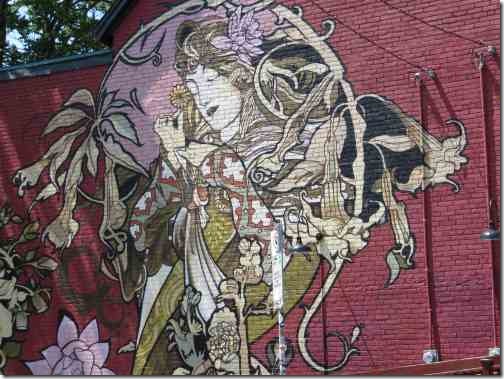Mercy and truth are met together; righteousness and peace have kissed each other. Truth shall spring out of the earth; and righteousness shall look down from heaven. (Hebrew poet number 85)
Where mercy is planted, truth sprouts up and the earth thrives. Truth and mercy are each other’s soil, vines, each other’s fruit. And where peace lives—rise the sunniest of days. But righteousness…looks from above, looks down its long nose from heaven.
I don’t sit well with righteousness. Righteousness is a cloud that rains guilt. Maybe it’s Sunday morning fundie-memories. Or maybe it’s because it’s been plied as an adjective or adverb too long. We’ve all been righteously indignant. Happens to me daily. Righteous umbrage comes on in a flash, I bristle beneath it; then it passes, leaving me feeling spilled on and slightly embarrassed.
Either way, whether it’s early memory or ill usage, righteousness now has the whiff of pusillanimous piety. It doesn’t venture far from church. It’s a dressed-up-Sunday-word that lacks the parts to walk the weekday streets. Instead it struts about carpeted sanctuaries waiting out the workweek to again be employed by some dominical-fist-on-pulpit. Or fired off like a rubber bullet from a moralizing six-point text.
And it’s something of a rank spectre. I mean it gets in vents in the foyers, in the curtains covering the lancet windows, in the choir gowns, and it all smells a bit funky like a mix of Lemon Pledge and Old Spice.
And it loves hiding under the kneelers waiting upon the wandering mind to recount a libidinous thought. For it is especially adept at making bawdy what is naturally beautiful, lewd what is loving.
So I’m not sure it’s worth resurrecting righteousness. Except, here in this song (Psalm), righteousness gets some redemption: before it seemingly gets all lofty, righteousness makes a pass at peace, makes out, gets concupiscently down with peace—and truth is the progeny.
This I dig. I can imagine righteousness as a far different sort of rain cloud here, raining down, watering truth and nourishing mercy and peace. And in this kind of buzzing blooming garden, righteousness is righteous.


Thank you for your reflection, Steven. I totally agree with you – righteousness has taken on a connotation that is outright stinky, for good reason. Sometimes I wonder if I bring my own baggage to this word, since it is so closely tied to ‘religion’. James reminds us that in fact “Pure and genuine religion …means caring for orphans and widows in their distress” and this turns our cultural idea of righteousness on its head – it is in fact a goodness that gets in the ditches and heals.
Thanks for this Gabriela! Yes, the James verse encapsulates it all.
Wow Stephen — does this strike a chord:
“I don’t sit well with righteousness. Righteousness is a cloud that rains guilt. Maybe it’s Sunday morning fundie-memories. Or maybe it’s because it’s been plied as an adjective or adverb too long. We’ve all been righteously indignant. Happens to me daily. Righteous umbrage comes on in a flash, I bristle beneath it; then it passes, leaving me feeling spilled on and slightly embarrassed.”
This type of (self-)righteousness describes many of my early experiences, experiences that led a very dear friend to turn rebellious. Unfortunately, this rebellion led to a path of self destruction. The relatives and church members were quick to judge, and then they turned away instead of helping a soon-to-be life-long alcoholic. This person, my age, just died a few days ago from liver failure.
But the concept of Mercy, of the type of religion that is described in James and reiterated by Gabriela — now that is indeed a fine vision of righteousness and peace uniting, kissing. We desperately need people to “get in the ditches”, to care, to show empathy. Or at least to start yelling that all is not O.K. any longer.
In the U.S.right now, the petty squabling in the Capitol is turning my stomach, as thousands of people die of hunger in East Africa. Our leaders are silent on this but quick to judge each other. People go on with their lives trying not to pay attention to either the problems at home or on the “dark continent”. I find this all to be such a sad statement of what we have become.
Thank you so much for your sharing your heart here Diane. And thanks for being one of the merciful ones.
Hey Steve – I wish you had written this last week. I preached on righteousness, from something the fourth Hebrew poet said. Specifically, he addresses God as “God of my righteousness.” (Some translations have “my righteous God” but the first is more precise). I thought about the temerity of thinking that I had any. My righteousness! And the fear on the other hand of what it meant if it’s true. My righteousness! God, Let it rain!
Thank you Sam. Loved your comment.